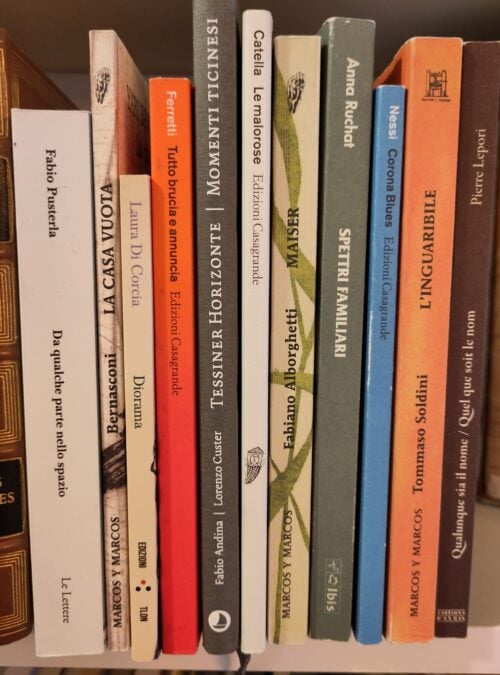Luca Di Fulvio: a literary case between Italy, France and Germany
Author: Manuela Corigliano

Almost a year has passed. It was 31 May 2023 when, after absent-mindedly scrolling through dozens of posts on Instagram, as we do every day, our eyes fell on a handful of words: Luca Di Fulvio was no more. There was consternation and immense sadness.
The number and tenor of the comments made by his readers on hearing of his untimely death are an accurate measure of what his novels were all about, and of the mark he left on those who had the pleasure of meeting him even once, at a book signing or on the fringes of a presentation.
Born in Rome in 1957, Luca Di Fulvio was as much a man of the theatre as he was a writer. And his interest in the theatre was also apparent in the way he orchestrated certain scenes in his novels, just as a certain theatrical gesture helped to enliven his way of talking about books.
Italian, very Italian, right down to a certain idea of elegance, in love with Rome, his publishing history nevertheless links him by a double thread to two countries which, in literary terms, welcomed, understood, loved and adopted him: Germany and France.
He had already published several other books, which were well received, but his breakthrough novel, thanks to German and French translations, was undoubtedly La gang dei sogni, published in Italy in 2008.
Slatkine & Cie (now Istya & Cie) was founded in France in 2016. The publishing house was still in the process of organising itself and defining its editorial line when, turning to Germany, it noticed what had become a veritable publishing phenomenon in that country: La gang dei sogni (which sold over 100,000 copies in Italy) had sold over 1.4 million copies in the German translation published by Bastei Lübbe. French publishers contacted Mondadori to acquire the rights to the novel. The Italian publisher first offered the book – that’s how it should be done – to the French publishers who had translated the previous works. They did not respond. Negotiations were concluded with Slatkine & Cie, who entrusted the translation to Elsa Damien. Le Gang des rêves was the first book published by the newly created Slatkine & Cie, and marked the beginning of an editorial and human partnership that, book after book, made Luca Di Fulvio a widely read and much-loved author in France, followed by readers there with an affection, loyalty and admiration for which Luca was very grateful. ‘France has adopted me’, he used to say.
The book came out at the beginning of June, but the big break came in July, when journalist Pascale Deschamps talked about it on the 13 o’clock news on France 2. It was a tremendous springboard for raising the profile of the book!
An incredible thing happened. That’s what makes this author’s publishing story so unique. Luca Di Fulvio presented his new novel to Mondadori, who were not very enthusiastic. The author then turned to his German publisher, and the unthinkable happened: the very Italian Luca Di Fulvio became a German author. Or rather: from then on, his books were first published in German translation by Bastei Lübbe, who then sold the rights to other countries, including Italy. The country where Di Fulvio lives and writes therefore publishes the originals of his novels as if they were foreign literature, after their publication in Germany. France, with Slatkine & Cie for the large format and Pocket for the paperback, continues to follow and accompany the author on a publishing journey that is making him increasingly popular with readers and booksellers. So, after Le Gang des rêves (published in 2016, a very happy baptism for the publisher), French bookshops are now seeing: Les Enfants de Venise (La ragazza che toccava il cielo) in 2017, Le Soleil des rebelles (Il bambino che trovò il sole di notte) in 2018, Les Prisonniers de la liberté (La figlia della libertà) in 2019, the children’s book Les Aventuriers de l’autre monde (I ragazzi dell’Altro Mare) in 2020 and Mamma Roma (La ballata della città eterna) in 2021. In 2023, The Hidden Paradise was published posthumously, in Germany in 2022 under the title Das verborgene Paradies, but not yet in Italy.
Mamma Roma was therefore the last book Luca Di Fulvio came to present in France. Given that he was already unwell at the time, the generosity with which he opened himself up to readers, answering every question, smiling for every photo and signing dozens and dozens of books was touching, to say the least.
In his novels, Luca Di Fulvio has travelled through different geographies and eras, changing landscapes and historical moments as one changes sets in a theatre. At the centre of the stage – at the heart of his works – he has placed characters who are not afraid to believe in their dreams and accept greater challenges than those to which their origins seem to predestine them.
As a storyteller of monumental intrigue, he celebrated the power of life.










